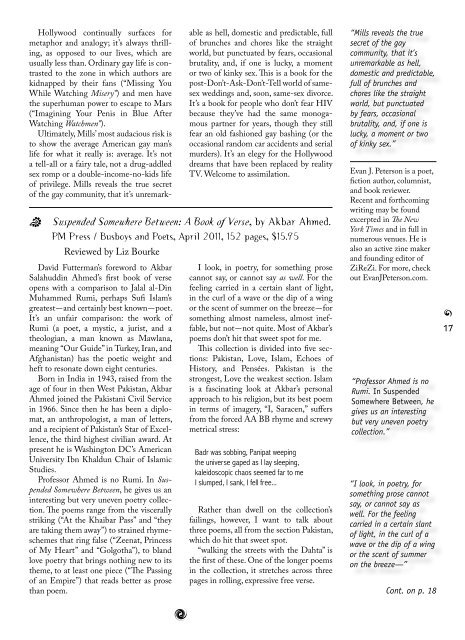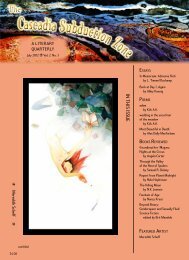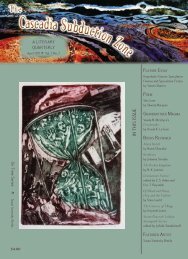Subduction
REviEwEd - The Cascadia Subduction Zone
REviEwEd - The Cascadia Subduction Zone
- No tags were found...
Create successful ePaper yourself
Turn your PDF publications into a flip-book with our unique Google optimized e-Paper software.
Hollywood continually surfaces for<br />
metaphor and analogy; it’s always thrilling,<br />
as opposed to our lives, which are<br />
usually less than. Ordinary gay life is contrasted<br />
to the zone in which authors are<br />
kidnapped by their fans (“Missing You<br />
While Watching Misery”) and men have<br />
the superhuman power to escape to Mars<br />
(“Imagining Your Penis in Blue After<br />
Watching Watchmen”).<br />
Ultimately, Mills’ most audacious risk is<br />
to show the average American gay man’s<br />
life for what it really is: average. It’s not<br />
a tell-all or a fairy tale, not a drug-addled<br />
sex romp or a double-income-no-kids life<br />
of privilege. Mills reveals the true secret<br />
of the gay community, that it’s unremarkable<br />
as hell, domestic and predictable, full<br />
of brunches and chores like the straight<br />
world, but punctuated by fears, occasional<br />
brutality, and, if one is lucky, a moment<br />
or two of kinky sex. This is a book for the<br />
post-Don’t-Ask-Don’t-Tell world of samesex<br />
weddings and, soon, same-sex divorce.<br />
It’s a book for people who don’t fear HIV<br />
because they’ve had the same monogamous<br />
partner for years, though they still<br />
fear an old fashioned gay bashing (or the<br />
occasional random car accidents and serial<br />
murders). It’s an elegy for the Hollywood<br />
dreams that have been replaced by reality<br />
TV. Welcome to assimilation.<br />
y Suspended Somewhere Between: A Book of Verse, by Akbar Ahmed.<br />
PM Press / Busboys and Poets, April 2011, 152 pages, $15.95<br />
Reviewed by Liz Bourke<br />
David Futterman’s foreword to Akbar<br />
Salahuddin Ahmed’s first book of verse<br />
opens with a comparison to Jalal al-Din<br />
Muhammed Rumi, perhaps Sufi Islam’s<br />
greatest — and certainly best known — poet.<br />
It’s an unfair comparison: the work of<br />
Rumi (a poet, a mystic, a jurist, and a<br />
theologian, a man known as Mawlana,<br />
meaning “Our Guide” in Turkey, Iran, and<br />
Afghanistan) has the poetic weight and<br />
heft to resonate down eight centuries.<br />
Born in India in 1943, raised from the<br />
age of four in then West Pakistan, Akbar<br />
Ahmed joined the Pakistani Civil Service<br />
in 1966. Since then he has been a diplomat,<br />
an anthropologist, a man of letters,<br />
and a recipient of Pakistan’s Star of Excellence,<br />
the third highest civilian award. At<br />
present he is Washington DC’s American<br />
University Ibn Khaldun Chair of Islamic<br />
Studies.<br />
Professor Ahmed is no Rumi. In Suspended<br />
Somewhere Between, he gives us an<br />
interesting but very uneven poetry collection.<br />
The poems range from the viscerally<br />
striking (“At the Khaibar Pass” and “they<br />
are taking them away”) to strained rhymeschemes<br />
that ring false (“Zeenat, Princess<br />
of My Heart” and “Golgotha”), to bland<br />
love poetry that brings nothing new to its<br />
theme, to at least one piece (“The Passing<br />
of an Empire”) that reads better as prose<br />
than poem.<br />
I look, in poetry, for something prose<br />
cannot say, or cannot say as well. For the<br />
feeling carried in a certain slant of light,<br />
in the curl of a wave or the dip of a wing<br />
or the scent of summer on the breeze — for<br />
something almost nameless, almost ineffable,<br />
but not — not quite. Most of Akbar’s<br />
poems don’t hit that sweet spot for me.<br />
This collection is divided into five sections:<br />
Pakistan, Love, Islam, Echoes of<br />
History, and Pensées. Pakistan is the<br />
strongest, Love the weakest section. Islam<br />
is a fascinating look at Akbar’s personal<br />
approach to his religion, but its best poem<br />
in terms of imagery, “I, Saracen,” suffers<br />
from the forced AA BB rhyme and screwy<br />
metrical stress:<br />
Badr was sobbing, Panipat weeping<br />
the universe gaped as I lay sleeping,<br />
kaleidoscopic chaos seemed far to me<br />
I slumped, I sank, I fell free...<br />
Rather than dwell on the collection’s<br />
failings, however, I want to talk about<br />
three poems, all from the section Pakistan,<br />
which do hit that sweet spot.<br />
“walking the streets with the Dahta” is<br />
the first of these. One of the longer poems<br />
in the collection, it stretches across three<br />
pages in rolling, expressive free verse.<br />
“Mills reveals the true<br />
secret of the gay<br />
community, that it’s<br />
unremarkable as hell,<br />
domestic and predictable,<br />
full of brunches and<br />
chores like the straight<br />
world, but punctuated<br />
by fears, occasional<br />
brutality, and, if one is<br />
lucky, a moment or two<br />
of kinky sex.”<br />
Evan J. Peterson is a poet,<br />
fiction author, columnist,<br />
and book reviewer.<br />
Recent and forthcoming<br />
writing may be found<br />
excerpted in The New<br />
York Times and in full in<br />
numerous venues. He is<br />
also an active zine maker<br />
and founding editor of<br />
ZiReZi. For more, check<br />
out EvanJPeterson.com.<br />
“Professor Ahmed is no<br />
Rumi. In Suspended<br />
Somewhere Between, he<br />
gives us an interesting<br />
but very uneven poetry<br />
collection.”<br />
“I look, in poetry, for<br />
something prose cannot<br />
say, or cannot say as<br />
well. For the feeling<br />
carried in a certain slant<br />
of light, in the curl of a<br />
wave or the dip of a wing<br />
or the scent of summer<br />
on the breeze—”<br />
Cont. on p. 18<br />
i<br />
17<br />
n




